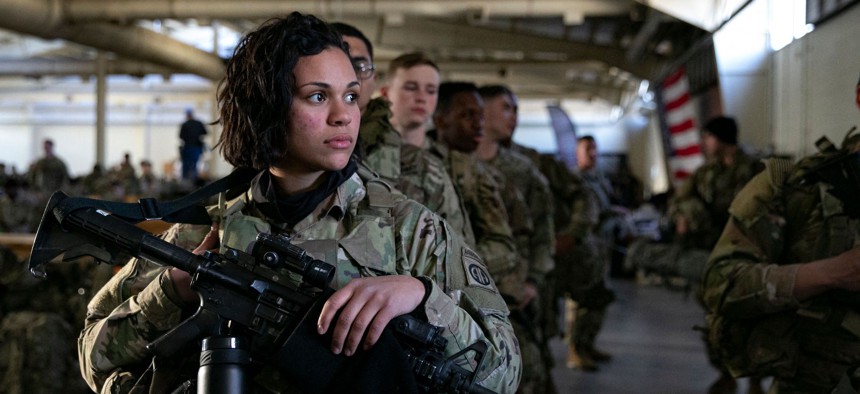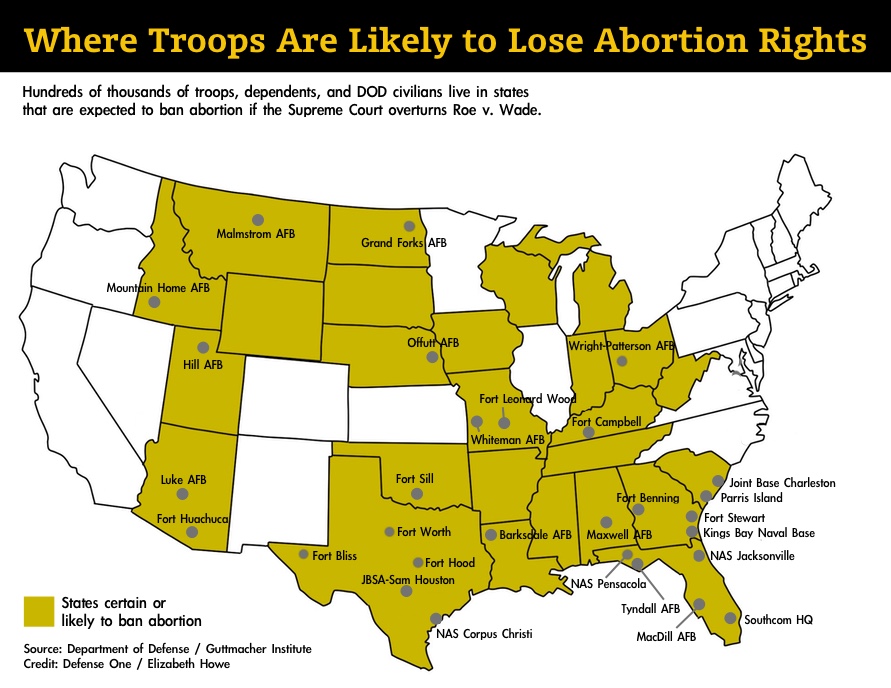
Soldiers of the 82nd Airborne Division wait to be deployed to Europe, February 14, 2021, in Fort Bragg, North Carolina. Allison Joyce/AFP via Getty Images
Reversing Roe Would Harm Military Readiness, Abortion-Rights Advocates Warn
“If a woman is considering enlisting, I would highly encourage her to rethink that choice,” said one veteran.
When Rachel VanLandingham was a lieutenant in the Air Force, she was ordered to accompany a female officer to a substandard medical facility in Seoul to get a “back-alley abortion.” Abortions were illegal in South Korea at the time, and her commander would not grant her two weeks off to get a legal abortion in the United States.
If the Supreme Court overturns Roe v. Wade—as is suggested by a draft decision revealed by Politico on Monday that was confirmed by Chief Justice John Roberts on Tuesday—some two dozen states are expected to quickly enact laws that put safe, legal abortions out of reach of many more U.S. troops.
“It was just shocking to me that this is what we were doing to service members. No one cared….It was abhorrent,” said VanLandingham, a former Air Force judge advocate who is now a professor at Southwestern Law School. “This isn’t occurring just in South Korea now. This is going to occur in Texas.”
Though the justices could change their minds and the draft before a final decision is released next month, advocates worry that making abortion illegal so widely and quickly could reduce military readiness; they are are calling on Congress and the Pentagon to ensure troops’ reproductive rights are protected.
Women in the military seeking an abortion already face more restrictions than their civilian counterparts. Abortions cannot be performed at military medical facilities and the cost of the procedures in private facilities aren’t covered by troops’ Tricare health insurance becasue of the Hyde Amendment of 1976, which prohibits the use of federal dollars for abortion unless the life of the mother is at risk, said Sean Timmons, the managing partner of law firm Tully Rinckey’s Houston office.
The repeal of Roe v. Wade is likely to make it more difficult for women in the military to find access to the procedure safely and legally, Timmons said. For example, a service member in Texas still has legal access to an abortion up to six weeks into her pregnancy, even if in practice new restrictions have forced many clinics to close. If the Supreme Court’s draft decision becomes final, troops will need to get a leave of duty approved, travel to another state, and potentially incur other expenses, such as a hotel stay. The increased burden could prompt women to “take matters into their own hands” and either seek out unsafe abortions or try to terminate the pregnancy on their own, Timmons said.

If each state has the freedom to ban or allow abortions, the reproductive rights of women in the military would depend on where the Defense Department stations them, a decision in which they have little say, VanLandingham said. If a woman from California, where abortion is expected to remain legal, joins the military and is stationed in Georgia, her access to reproductive healthcare will be limited by her decision to join the military.
“They did not choose to live in that state. They chose to volunteer to sacrifice themselves for their country, but they didn't volunteer to sacrifice their reproductive rights,” VanLandingham said. “It’s something that men in the military don’t have to sacrifice, why should women?”
More than half of states, including many in the South, are poised to ban abortion if the Supreme Court overturns Roe v. Wade, while others already have laws on the books that will immediately go into effect based on the court’s ruling. Those states, including Texas, Georgia, and Florida, are also home to hundreds of thousands of troops on some of the nation’s largest military installations.
Advocates said there are steps Congress can take to protect the reproductive rights of service members, but there’s little reason for optimism given lawmakers’ known stances that have so far made action on abortion impossible. Just as active-duty troops pay state income taxes or register their car in their state of legal residence, not the state where they are stationed, VanLandingham said Congress could pass a law saying a female service members’ access to abortion can not be worse than what it would have been in her home state.
Others called on the Pentagon to take action to protect its female service members, as well as the wives and children of men who serve. Erin Kirk-Cuomo, who served in the Marines before co-founding Not In My Marine Corps, said the Defense Department should consider a round of Base Realignment and Closure, or BRAC, to close military facilities in states that are not protecting the rights of troops, a politically unpopular move on Capitol Hill that would certainly catch the attention of lawmakers looking to keep the bases in their districts open.
Kirk-Cuomo also encouraged women and their allies to protest the court’s decision by not joining the military, especially since a woman’s access to end a pregnancy would be limited at the same time that cases of sexual assault in the military are on the rise.
“Along with sexual assault comes more unwanted pregnancies,” she said. “When you have the highest rates of sexual assault our country has seen in the military, it’s going to impact the readiness of the force.”
“I would not want to enlist in a military that isn’t protecting me in the service from being assaulted and also won’t protect me after the fact,” she continued. “If a woman is considering enlisting, I would highly encourage her to rethink that choice.”
VanLandingham said it’s too soon to know how enlistments will be impacted if the Supreme Court’s decision is final, but how the military tries to support service members will also matter. The Air Force, for example, has offered support to service members in states that have recently passed laws restricting LGBTQ rights, including medical aid, legal help, or relocating families if needed.
That’s not a practical solution for women in states that ban abortion, but the military could take steps to assist female troops seeking an abortion.
“You can’t have an all male base in Texas…but they can give some indication that the military cares and understands that women could face this dilemma,” VanLandingham said. “They can express that we will try to help you, and will give you the leave when you ask for it.”







